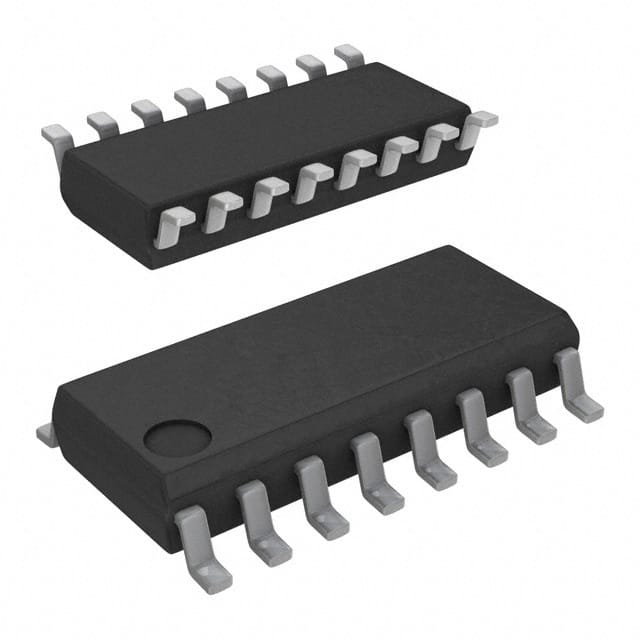Xem thông số kỹ thuật để biết chi tiết sản phẩm.

SN74F138DR
Product Overview
- Category: Integrated Circuit (IC)
- Use: Decoder/Demultiplexer
- Characteristics: High-speed, low-power consumption
- Package: SOIC (Small Outline Integrated Circuit)
- Essence: Decodes binary information into multiple output lines
- Packaging/Quantity: Tape and Reel, 2500 units per reel
Specifications
- Supply Voltage: 2V to 6V
- Input Voltage: 0V to VCC
- Output Voltage: 0V to VCC
- Operating Temperature Range: -40°C to +85°C
- Propagation Delay Time: 11 ns (typical)
- Output Current: ±24 mA
Detailed Pin Configuration
The SN74F138DR has a total of 16 pins. The pin configuration is as follows:
- GND (Ground)
- A0 (Address Input 0)
- A1 (Address Input 1)
- A2 (Address Input 2)
- /G1 (Enable Input)
- Y0 (Output 0)
- Y1 (Output 1)
- Y2 (Output 2)
- Y3 (Output 3)
- Y4 (Output 4)
- Y5 (Output 5)
- Y6 (Output 6)
- Y7 (Output 7)
- VCC (Supply Voltage)
- /G2A (Enable Input)
- /G2B (Enable Input)
Functional Features
The SN74F138DR is a 3-to-8 line decoder/demultiplexer IC. It takes three address inputs (A0, A1, A2) and one enable input (/G1) to decode the binary information and generate eight output lines (Y0-Y7). The enable inputs (/G2A, /G2B) further control the operation of the decoder/demultiplexer. It operates at high speed and consumes low power, making it suitable for various digital applications.
Advantages and Disadvantages
Advantages: - High-speed operation - Low power consumption - Compact SOIC package - Wide operating voltage range - Multiple output lines for versatile applications
Disadvantages: - Limited number of address inputs (3 bits) - Output current limited to ±24 mA
Working Principles
The SN74F138DR works based on the principle of binary decoding. The three address inputs (A0, A1, A2) represent a binary code, which is decoded internally to activate one of the eight output lines (Y0-Y7). The enable inputs (/G1, /G2A, /G2B) control the overall operation of the decoder/demultiplexer. When the enable inputs are active, the selected output line becomes active, while all other output lines remain inactive.
Detailed Application Field Plans
The SN74F138DR can be used in various applications, including but not limited to: - Address decoding in microprocessors and microcontrollers - Memory selection in digital systems - Data routing in communication systems - Signal demultiplexing in multimedia devices - Control logic implementation in industrial automation
Detailed and Complete Alternative Models
Some alternative models that offer similar functionality to the SN74F138DR include: - 74HC138: High-speed CMOS version - CD74HCT138: High-speed TTL version - DM74LS138: Low-power Schottky version - MC14538: Dual 1-of-4 decoder/demultiplexer
These alternative models provide different characteristics and may be suitable for specific application requirements.
Word count: 334 words
Liệt kê 10 câu hỏi và câu trả lời thường gặp liên quan đến ứng dụng SN74F138DR trong giải pháp kỹ thuật
Sure! Here are 10 common questions and answers related to the application of SN74F138DR:
Question: What is SN74F138DR?
Answer: SN74F138DR is a decoder/demultiplexer IC (integrated circuit) that can be used in various technical solutions.Question: What is the purpose of SN74F138DR?
Answer: SN74F138DR is used to decode binary information and select one output line from multiple input lines.Question: How many input lines does SN74F138DR have?
Answer: SN74F138DR has 3 input lines, which can represent up to 8 different combinations.Question: How many output lines does SN74F138DR have?
Answer: SN74F138DR has 8 output lines, allowing selection of one output based on the input combination.Question: What is the voltage range supported by SN74F138DR?
Answer: SN74F138DR supports a voltage range of 2V to 6V.Question: Can SN74F138DR be used in both digital and analog applications?
Answer: No, SN74F138DR is designed for digital applications only.Question: What is the maximum operating frequency of SN74F138DR?
Answer: The maximum operating frequency of SN74F138DR is typically around 100 MHz.Question: Can SN74F138DR be cascaded to increase the number of input/output lines?
Answer: Yes, multiple SN74F138DR ICs can be cascaded together to increase the number of input/output lines.Question: Is SN74F138DR compatible with TTL logic levels?
Answer: Yes, SN74F138DR is compatible with TTL (Transistor-Transistor Logic) logic levels.Question: What are some common applications of SN74F138DR?
Answer: SN74F138DR is commonly used in address decoding, memory selection, data routing, and general-purpose digital logic circuits.
Please note that these answers are general and may vary depending on specific use cases and requirements.

